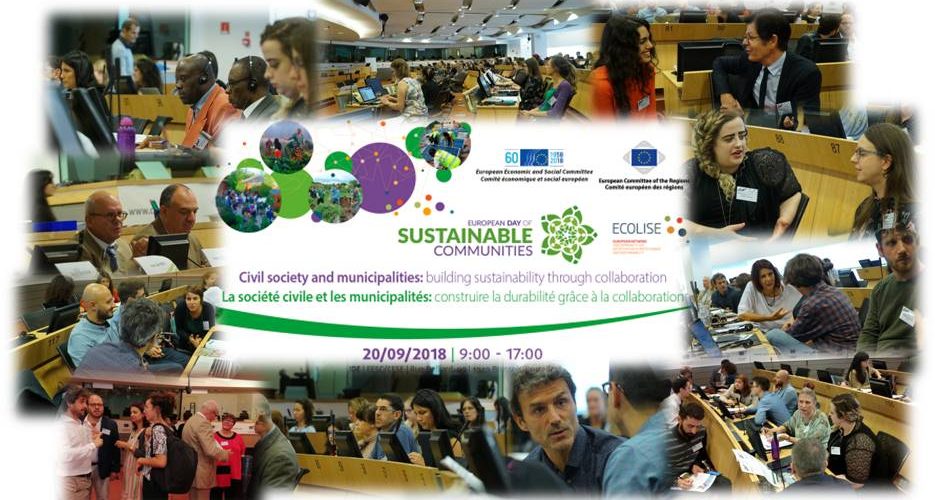
The MiT at the European Day of Sustainable Communities, Brussels september 2018
On the 20th of september 2018 the European Day of Sustainable Communities was celebrated in Brussels, co-hosted by the European Economic and Social Committee (EESC) and the European network for community-led initiatives on climate change and sustainability (ECOLISE), in collaboration with Transition Network and the Committee of the Regions.
Citizen and community-led action on climate change and sustainability has spawned a dynamic, grassroots movement, with thousands of communities across Europe striving to redefine our relationship with the natural world by designing and testing new economic, social and environmental innovations that promote regeneration and sustainability.
There is growing evidence and recognition that these bottom-up approaches are an essential complement to top-down approaches in achieving the radical, structural and lasting lifestyle changes necessary for creating an equitable, sustainable and low-carbon society. Increasingly, these community initiatives are engaging in dialogue with municipal partners, helping to inspire and even reorient municipal activities, in line with longer term climate and sustainability goals.
The conference has facilitated a conversation in which participants were able to share experiences, and explore ways to encourage and support this type of collaboration, with also online participants, thanks to the internet streaming of most of the conference. The Municipalities in Transition (MiT) project was at the centre of the discussion topics and the whole MiT core team (Ana Huertas, Juan del Rio, Cristiano Bottone and Tommaso Brazzini) was attending the event.
People participating were from different background and from different type of organizations. According to the poll, 29% of participants were from NGOs, 26% from Municipalities or local government networks, 19% from Community/grassroots organisations, 12% individual interested in the event, 12% Other non specified type of organisation, 4% from Business, 4% from EU institution
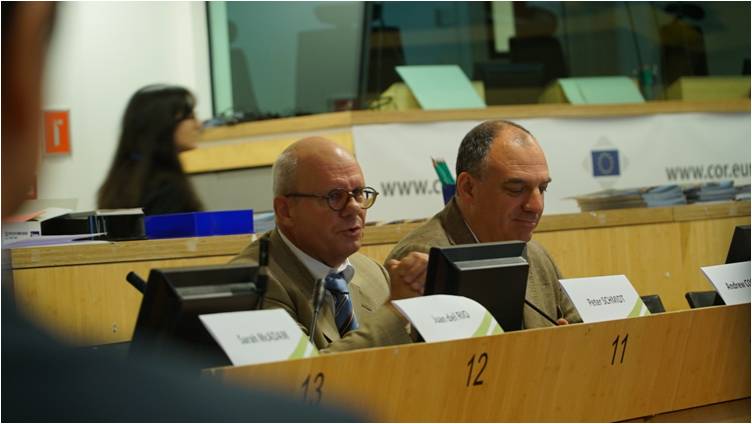
The event was cofacilitated by Sarah McAdam, Transition Network, and Juan del Rio, Red de Transición España and MiT core team.
The Welcome remarks started with Peter Schmidt, President of the Sustainable Development Observatory, EESC member and Andrew Cooper, UK/EA, Rapporteur on Climate governance after 2020: a European and global perspective – a contribution to the UNFCCC COP24, European Committee of the Regions.
After that, the discussion followed to Connecting to what’s happening on the ground, and the MiT was the main topic to be presented, according to the following succession:
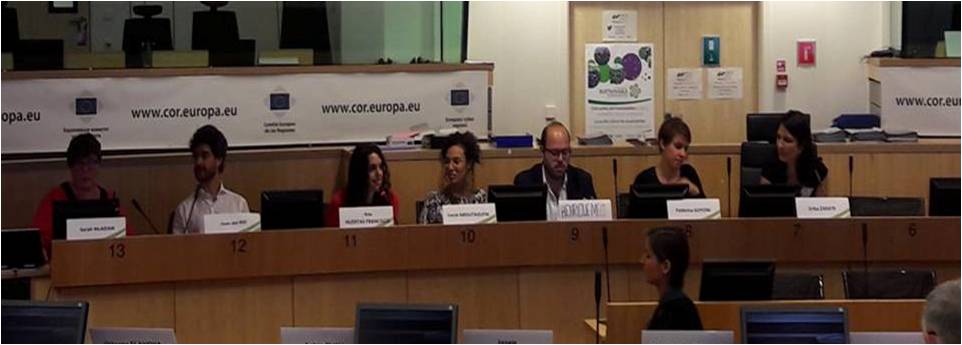
- Ana Huertas Francisco, ECOLISE Vice President, Red de Transición Spain and Municipalities in Transition Coordinator
- Lucia Aboutaoufilk, 21Solutions, Presentation of the VILCO project
- Short video from the Municipalities in Transition project: Voices from the pilots
- Representatives from MiT pilots (Italy, Portugal and Spain):
- Federica Govoni, representative of the transition town Valsamoggia in the region of Emilia Romagna, Italy
- Henrique Sá Melo, representative of the project Telheiras Parceria Local, from the neighborhood Telheiras in Lisbon, Portugal
- Erika Zárate, part of the project Resilience.earth in La Garrotxa, a region within Catalonia, Spain
“Bamboo growth metaphor: after developing under ground for 7 years, without much being visible above the ground, bamboo sprout grows 7 meters high in 7 weeks!”
Erika Zárate (La Garrotxa – Spain)
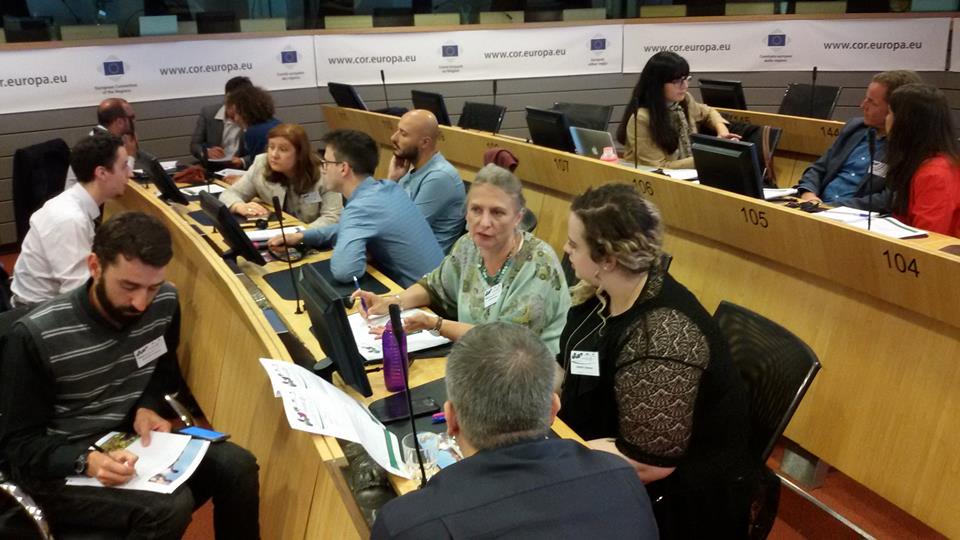
After a short coffee break the event focused on Breakout sessions about 4 pre-selected themes focused on Creating impactful collaboration between citizens and municipalities:
- Taking a systemic approach to collaboration
What are the tools, structures, processes and practices that support community groups and municipalities to approach collaboration systemically rather than in a siloed way? How can we work well with emergence and complexity, responding flexibly to the energy and interests of citizens and to strategic needs and opportunities as they arise? What challenges does this present for us as individuals, organisations and institutions? - Resourcing collaboration in a strategic and sustainable way
How are people currently accessing resources to support this innovative work? What are the aspects of the work where there is the greatest need for additional resource and the greatest potential to increase the impact of this collaborative activity? How might we create funding frameworks and programs which would support such collaborations to spread, deepen and operate sustainably? What are the barriers to funding this kind of initiative (as experienced by practitioners and by potential funders) and how might these barriers be overcome? - Sharing power and nurturing real collaboration
What are the benefits and the challenges that arise when municipalities enter into genuine co-creation with their citizens? What tools, structures, processes and practices support us to share power and collaborate creatively across difference? - Exploring the role of the EU to support collaboration
Where and how does top-down meet bottom-up? How can EU institutions support and connect to innovative collaborations involving grassroots groups? Do we know what policy barriers are being experienced and how they might be overcome? If not, how can we start to collect and act on this information?
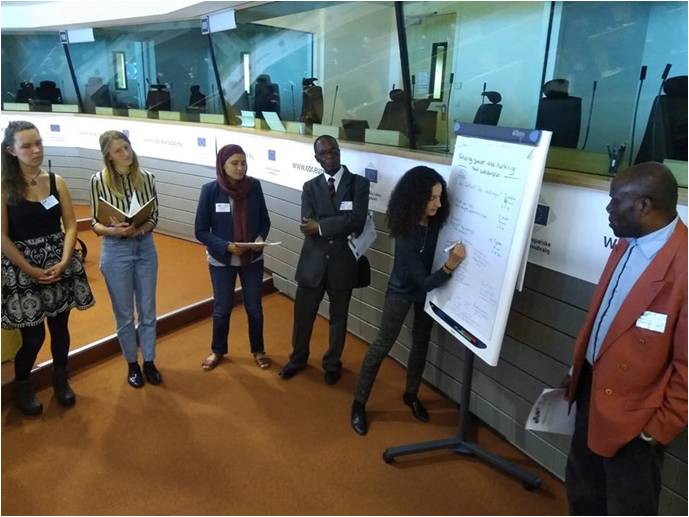
During the Harvesting many interesting thoughts came out of this co-participative process, to name few of them:
- Communication is one of the main issues, there is a big barrier to reach audience. It could be useful to build a common language & common ground to reach people and call for action.
- the problem of the methodology: there is no ready-made framework with a local yet systemic approach rather than thinking in silos. At the same time it is difficult to assess the impact of a certain action/methodology.
- challenge of securing funding/resources without clear designed outcomes, with possible solutions related to funding people rather than projects, with community activist fellowship. Need of a shift from donors to investors. Challenge of the fundings, which too often are too short-term
- The need to work on the succession from cooperation to coordination to collaboration
- The need of spaces of deep listening and sharing (sort of personal transparency)
- The challenge of imbalance of time and capacity
- Education should serve the sensibilization of all actors
“Problem is solution. Volunteer community initiatives find it difficult to collaborate with municipalities, and people working in municipalities are wondering how to engage citizens”
Ana Huertas, ECOLISE Vice President, Red de Transición Spain and Municipalities in Transition Coordinator
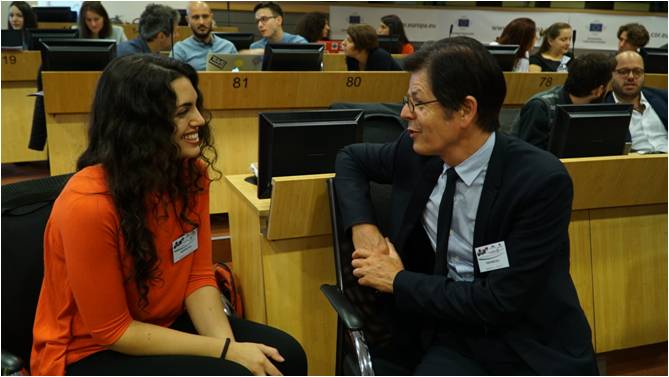
This moment witnessed a lot of participation both from in-person and online participants with the sli.do application and facebook group.
After the buffet lunch the topic shifted to What can the EU deliver to support Communities and Municipalities with the presence of Rudolf Niessler, Director G Smart & Sustainable Growth & Southern Europe, DG REGIO, European Commission, and Ms Višnar Malinovská, DG CLIMA, European Commission. This session was moderated by Sarah McAdam and the public could interact with Q&A.
The following session was the Panel discussion: Collaboration between Communities and Municipalities; Challenges and Possibilities (Moderated by Sarah McAdam and Discussion with the audience). The Panel was composed of:
- Ana Adzersen, WEBXLs/Fearless Cities
- Cristiano Bottone, Municipalities in Transition and Transition Italia
- Andrew Cooper, European Committee of the Regions
- Katrien Rycken, Coordinator Leuven 2030
First of all the discussion was focused on the topic of a systemic approach to collaboration. Then the discussion moved to resourcing this work and the role of the EU in supporting collaboration. Last topic covered the issue of sharing power.
It was quite clear, from the various interventions, that if we observe the effects of CO2 emissions after european policies, we are still far from the objectives proposed in the Paris agreement. It would be useful to accept the failure of certain policies and funding management and give space (and funding) to new experimental projects with a long-term vision, considering that reaching a maturity can take few years (generally more than what is normally funded).
The last intervention, as a Closing remarks, was led by Brenda King, member of the Sustainable Development Observatory, EESC member
“Working systemically can mean changing the system. What are the chances of getting society to accept ‘degrowth’?”
Nicola Hillary, Transition Network“I don’t think we need to make people to accept anything […degrowth will happen anyway because of thermodynamics…], we need to create spaces for people to create new realities.”
Cristiano Bottone, The MiT core team and Transition Italy
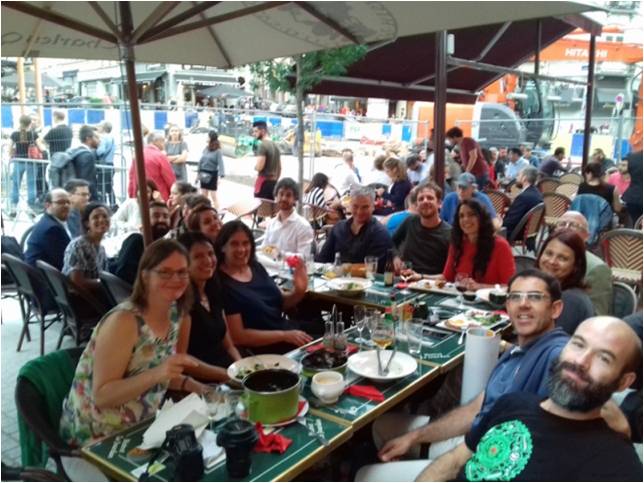
Interesting projects, initiatives, contributions of all kinds have arisen during the breakout groups and the whole event. We leave here a list of some useful links and online resources. Food for thought for anybody interested:
- #SIDeclaration policy proposal: Social Innovation Fellowships
- Cooperation, Coordination, Collaboration [Keast]
- Facebook page of the event
- Link to the video of the whole event
- ECOLISE facebook page
- Facebook page of 21 solutions
- Facebook group of the MiT Community of Practice
- An interesting video suggested by Andrew Cooper, “the impossible hamster” as a metaphor of our own society
If you are interested in the contributions from the MiT project to the event, you can find below the videos of three of the interventions:
The intervention of Ana Huertas:
The intervention of Federica Govoni:
The intervention of Erika Zarate:
Voices from the Pilots:
Leave a comment